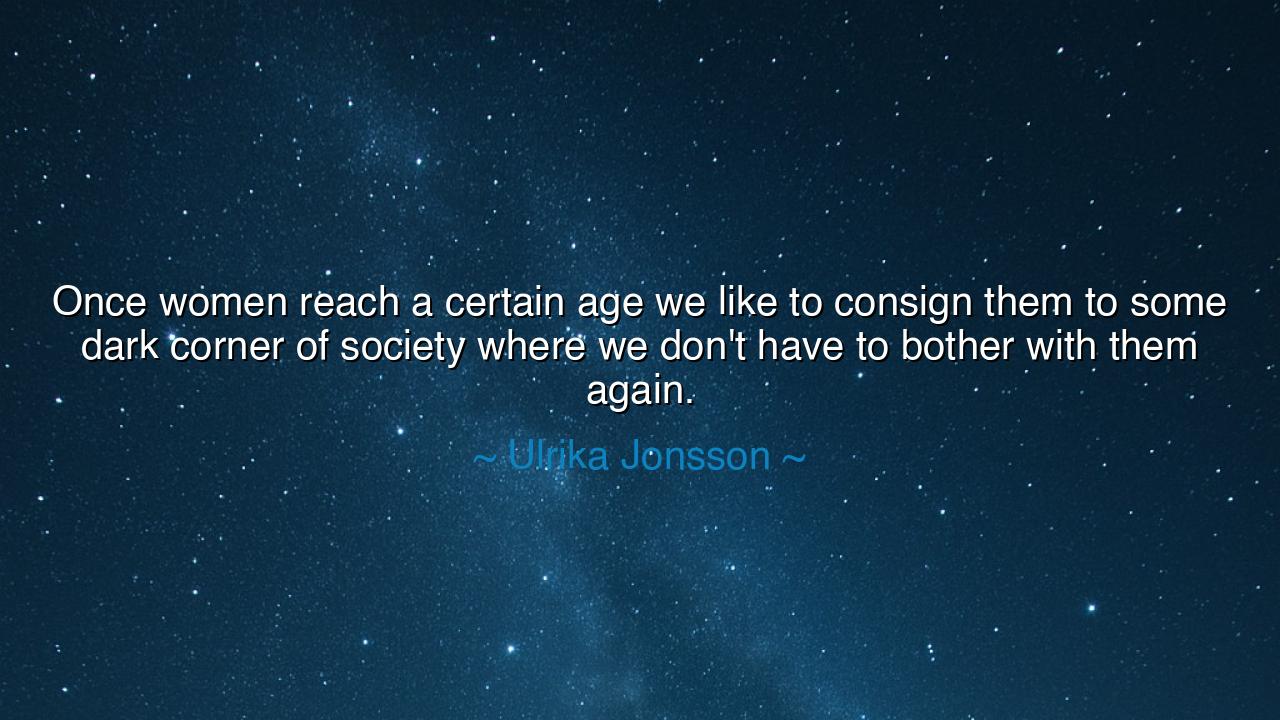
Once women reach a certain age we like to consign them to some
Once women reach a certain age we like to consign them to some dark corner of society where we don't have to bother with them again.






"Once women reach a certain age we like to consign them to some dark corner of society where we don't have to bother with them again." – Ulrika Jonsson
In the echoes of history, one of the most deeply ingrained, yet profoundly unjust, societal patterns is the treatment of women as they age. Ulrika Jonsson’s words resonate with the painful truth that, in many cultures, the value of women is often tied to their youth, their beauty, and their perceived usefulness. When women grow older, they are often cast aside, seen as no longer relevant or worthy of attention. This dismissal, this relegation of women to a “dark corner of society,” is a reflection of a deeper flaw in human thinking, one that disregards the wisdom, strength, and rich experiences that women gain with age. Just as the seasons change and bring with them their own beauty, so too does a woman’s life deepen with age, yet society often fails to recognize this truth.
The ancient Greeks spoke of the wisdom of age through their reverence for elders. Sophocles, in his play Antigone, explores the theme of wisdom and youth. The elder characters, though past their prime in years, held great wisdom and insight, while the younger characters were often filled with impetuousness and hubris. In the world of Athenian democracy, the older men were often the ones entrusted with leadership, because they were believed to possess the kind of judgment that could lead society wisely. Yet, even in such a system that nominally valued age and wisdom, there remained a dangerous tendency to marginalize those who were not seen as immediately useful or productive in physical terms. In this way, the idea of consigning older women to a “dark corner” is not a new issue but an ancient one—one that has endured despite the wealth of wisdom that older women bring.
Consider the story of Hippatia, the philosopher, mathematician, and astronomer of ancient Alexandria. She was a brilliant woman, highly revered in a time when knowledge and intellectual pursuits were largely dominated by men. Despite her immense wisdom and contribution to learning, she was brutally murdered in a moment of political and religious frenzy. Hippatia’s death represents the tragic disregard for the power and value of women who challenge societal norms and who grow into their power as they age. Like Hippatia, many older women throughout history have been silenced or cast aside, not for lack of ability, but because they do not conform to the narrow expectations of what is considered valuable by society at the time.
Jonsson’s words also speak to the patriarchal structures that often dictate the roles of women. In these structures, youth is worshipped, and the beauty of women is idolized as if it were their highest worth. Yet, this perception is as superficial as it is damaging. Aristotle believed that virtue was the highest quality a person could attain, and that virtue deepened with age as one learned through experience. In the same way, the virtues of patience, resilience, empathy, and strength deepen in women as they age, as they face the challenges of life, experience loss, and triumph in small ways every day. Yet, society often fails to recognize the richness of these qualities, opting instead to dismiss older women, forgetting that their true strength lies not in their appearance, but in their character.
In the modern world, this societal blindness toward the value of older women persists. Media, entertainment, and advertising often present women as youthful and beautiful as if these are the only traits that define them. When women grow older, they are frequently invisible—or worse, they are seen as a burden or as irrelevant. Jane Austen, in her novels, often highlighted the silent suffering of older women who were marginalized in a world where marriage and youth were considered their primary purposes. Yet, even in these roles, Austen gave her female characters depth and intelligence, showing that their worth was not tied to the years of their lives but to the richness of their inner worlds.
The lesson to be learned from Jonsson’s words is this: society must recognize the true value of women, not for what they can give to others in physical or youthful terms, but for their experience, wisdom, and inner strength. Just as we value the elders of a community for their wisdom, we must also value the women who have lived lives full of struggle, learning, and growth. As we grow older, we must ensure that we do not lose sight of the invaluable contribution that older women bring to society—whether it is in the form of knowledge, love, or leadership.
In practical terms, this means that we must celebrate the lives and contributions of older women in our communities. We must ensure that they are not sidelined, but embraced for the fullness they bring to society. From creating spaces where older women can teach and lead to shifting the conversation in media and culture, it is time to value the experience and wisdom of women of all ages. Let us not consign anyone to the shadows simply because they have passed a certain age, but instead, let us honor them, listen to their stories, and learn from their rich and enduring strength.






AAdministratorAdministrator
Welcome, honored guests. Please leave a comment, we will respond soon